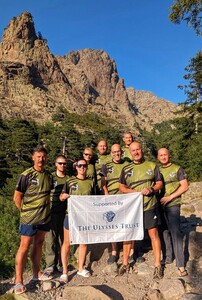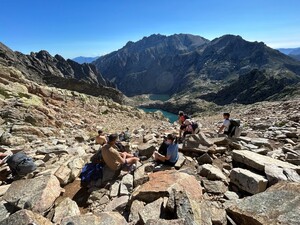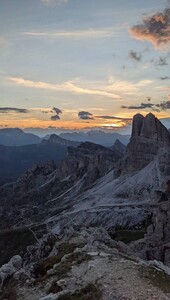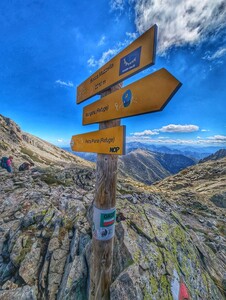Introduction
2024 saw our unit (6 RIFLES Army Reserve), conduct its first large scale Adventure Training (AT) Exped to the High Atlas Mountains in Morocco, this was kindly supported by the excellent work of the Ulysses trust. The idea was always to do more and keep progressing in order to provide the best opportunity for our workforce. In that regard, this year we decided on an even more challenging project, the Northern Section of the GR 20 in Corsica. What is the GR20 you might reasonably ask?
“The French Grande Randonnée No. 20, better known as the GR20, is an 112-mile long hiking trail in Corsica. It’s also routinely described as the toughest long-distance hiking trail in all of Europe”.
Why were we there?
The aims of AT are well known to most, resilience, to experience exposure to controlled risk, leadership, all of which are important and certainly featured in our Exped. For many this would be a first exposure mountaineering and for most the longest number of consecutive trekking days. We had prepared well and had an excellent team that we have built on since last year’s epic adventure in the High Atlas.
What was the aim?
The main aim was to conduct nine days trekking over the Northern portion of the GR20 route, this would see us moving from mountain refuge to refuge crossing extremely complex and difficult terrain in all weathers and conditions.
The Team
The team was certainly a good mix of both experience, age, rank, and ability, this was deliberately chosen to be so as to reflect the wide dynamic nature of the Army Reserves. As Exped leader I was ably assisted by my ever-patient 2IC Stephen Barnes with Carl Rawes as lead mountain expert and Katy Parrott as our qualified Exped medic. We were extremely fortunate to have Carl Rawes as a guest mountain leader, a veteran of many such Expeds, Carl’s experience, calm manner and humour were invaluable to all.
First impressions
Flying into Corsica, Bastia airport I could see from my window what I would describe as something from the set of the Jurassic Park movies! Jagged peaks of rock on top of large mountains surrounded by alpine looking forests gave me a real sense of scale and a great deal of respect for what we were about to attempt. For some of the team the mountain environment was to be a new experience, so I can only imagine their thoughts as we got closer, and the mountains got bigger and bigger.
First steps
Due to the time of day, we arrived we opted to get into a hotel for the night in a place called Calvi. Calvi is a town situated on the Northwestern coast and was in close proximity of our trekking start point a small village called Calenzana about 20 minutes’ drive from Calvi. The night in the basic but adequate hotel allowed us time to get ourselves and our equipment ready for the trek that would soon begin in earnest. The next day (very early), we got a taxi to the start point in Calenzana and it was from there that the real business of the trek began. Each person would be carrying all they needed for the complete trek, the only thing we could pick up on route was additional food and water and accommodation (mainly tents)., in a series of mountain huts or “refuges”, that form the GR20 route.
Daily routine
It was vital that we establish a good routine as quickly as possible, this is particularly important for those new to this environment and would help them settle in and start to learn the skills required to not just survive but thrive in the mountains.
- 0700- Everyone to be showered (where available) and dressed ready for morning brief.
- 0800- Brief on the day’s activity and dynamic risk assessment by safety team.
- 0800 onwards- Breakfast. This consisted of porridge, bread, fruit or whatever was available from the refuge shops on the route.
- 0900 – activity begins (on longer days these timings were bought forward so we could trek in the cooler morning periods for longer).
- 1300- Lunch, this was a packed meal that could be carried and consumed on the trekking route, most opted for a sandwich, some fruit and chocolate, again anything that was available from the small refuge shops.
- 1930- Evening meal, this was a highlight for all after hard days of trekking, most of us were tracking at least 3500 calories burned each day (many if not all are somewhat slimmer post Exped). The refuge “guardians,” produce fresh meals that range from simple omelettes, stews or pasta dishes, all high Carb and high in energy, equipping us for the trials of the next day.
- 2130- at the end of each day myself as the Exped leader and Carl would assess the next day’s trekking activity, I would speak to the whole team and our logistics lead Mark Dallyn would co-ordinate the plethora of administration tasks that required close attention, Mark did an excellent job throughout and is to be commended for their efforts. Our medic would run a “sick bay” dealing with very minor ailments like blisters or “travellers’ tummy,” Katy did all this with a great sense of humour and is a real asset to our team.
Why is the GR 20 so difficult?
I would say that I am an experienced person in the mountain environment, as would some of the team we took, with this in mind you may reasonably ask “why is the GR20 so difficult”? If I had to use one word for why I would say “relentless”, there are NO EASY DAYS on the GR20, each day has a host of different challenges, be it complex terrain, scrambles, the weather, the length of the journey (or all of these at once), all meant that every day had to be taken very seriously and planned/executed like a mini-expedition on its own. The route feels very remote and requires total commitment, some of the team who are not too fond of heights were pushed well outside their “comfort zones,” but always safely and with the best equipment and mentoring possible.
The future
One cannot spend time in such pursuits and not learn about yourself, the team and gain a better understanding of the world. Trekking in remote mountain areas lends a sense of perspective and it is that I and others will remember. We live in dangerous and complex times, but there is still beauty and challenges to be had by those willing to sacrifice time and energy. As a team we finished the Exped as a much closer unit, all will improve as people but also as soldiers as a result of our challenging Exped.
Comment
From the 2IC Steve:
“As a full time, Safety Practitioner for the Army, these expeditions provide an opportunity to gain valuable CPD for the planners (including myself) in the planning process, and for all to consider the subject of risk management. This is a key skill for all military personnel (and for anyone really). Only by controlled exposure to risk can we learn to manage it. Risk cannot be removed from life and has to be faced and dealt with. The expedition plan and risk assessment removed all risk to ‘As low as Reasonably Practical’ (ALARP) without sacrificing any of the key aims. Risk must be balanced to gain the most from it without putting people in unnecessary danger. The GR 20 is undoubtedly a high-risk enterprise, with danger from heights, cold and hot weather injury, falls, muscular skeletal issues to name the obvious. By recognising these issues and having robust plans to deal with them the team was in a very good place throughout. Suffice to say, there were no major issues, and all members returned safe and sound, with the satisfaction of having completed an arduous activity in good order, and with the added bonus of improving their knowledge on the whole principle of risk management.”
From the team medic Katy:
“This was my first time deploying in my role as a medic on an AT Exped, I have extensive experience in the mountains but not in this role. Fortunately, the team was full of very experienced people who are used to this kind of event, so my skills were only used for minor issues such as cuts and abrasions. The Ulysses trust grant helped us purchase some excellent mountain first aid kits that added value on this Exped but will also continue to add real value for future trips. Opportunities to conduct long AT trips like this do not come around very often so I am very grateful for the opportunity and for the assistance from the trust.”
From a team member and mountain novice Nicky:
“Despite having been in the Army for many years, this is my first experience of a long distance, multi day mountaineering Exped (my normal “go to” sport is cycling). Many of the team are a lot more experienced in this environment and this was a great help, especially in the preparation phase when selecting and packing for the trek. I soon learned that the most important thing to have is a positive attitude (and a head for heights helps). AT events like this are a great motivator and I will take that motivation forward into my life in general, as well as a new set of skills. Assistance from the trust is essential to smaller scale Exped’s and I would like to thank the trust for the assistance given.”





